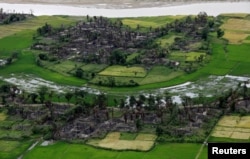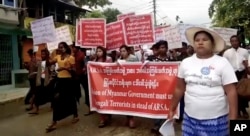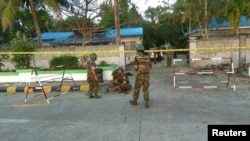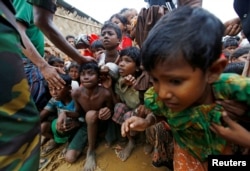Members of the international community and Rohingya who have fled to Bangladesh are not the only groups that are critical of the government’s planned repatriation program; Buddhist Rakhine residents have also expressed dissatisfaction with the process.
It has been more than two months since Myanmar and Bangladesh signed an agreement to begin returning some of the estimated 700,000 Rohingya who fled northern Rakhine State in the the wake of a brutal military crackdown last year. But the process continues to be stalled.
Unhapy Buddhists in Rakhine State
Sein Gyaw, a civil society leader in Rakhine State, told VOA that local residents were frustrated because they had not been consulted on the issue.
“The government has not discussed with the people about this issue, and many people are worried about it,” said Sein Gyaw, saying that many Rakhine were concerned that those returning under the process could include “terrorists,” a reference to fighters from the Arakan Rohingya Salvation Army, the group that launched attacks on August 25, which triggered the military crackdown.
“People here do not want to fight with the Muslims. But they also don’t agree that they are citizens. They don’t want non-citizens to come back to this country,” he said, expressing a view shared by much of Myanmar’s population that the Rohingya are not one of Myanmar’s “official races.”
Unrest affects the economy
At the market in downtown Sittwe, the Rakhine State capital, vegetable seller Daw Hla Khin told VOA that trade in the town had slowed considerably in recent years, but particularly since the uptick of violence in August.
“This year, we are seeing less and less trading,” said Hla Khin Myint. “We are not happy about this. Since the conflict started, our trade of vegetables has almost stopped, and we can’t get any more money.”
Although she said she wanted to see an end to the conflict, Hla Khin Myint said she was less sure when asked about her view towards the repatriation process. She said she wasn’t sure if Rakhine and Rohingya could live side by side, such was the level of animosity since violence flared across Rakhine State in 2012.
Hla Thein, another vegetable seller in the market, was more forthright in his views.
“The Muslims launched this attack, I think, because they don’t want to live side by side with Rakhine people,” said Hla Thein. “They don’t want to live side by side with us, and I don’t think we can,” he said.
Problems with the process
Earlier this month, Myanmar’s government said that after reviewing the names, photos and home villages of 8,032 displaced people sent to them by Bangladesh, only 193 were identified “as having lived in Myanmar,” a key condition for the Myanmar government in accepting returnees. It is not clear if those 193 people had voluntarily decided to return.
Win Myat Aye, minister for social welfare, relief and resettlement, could not be reached for comment.
Many Rohingya inside Bangladesh have expressed concern about returning to Myanmar out of fears for their safety.
How sincere Myanmar is in allowing Rohingya to return to the country was brought further into question recently after comments by Senior General Min Aung Hlaing that were highly critical of the Muslim minority.
At a gathering in Kachin State on March 26, the general referred to the group as “Bengalis,” a term that reinforces the view that they are illegal immigrants, and said they “do not have the characteristics or culture in common with the ethnicities in Myanmar.”
“The tensions were fueled because the Bengalis demanded citizenship,” he said.
The comments brought a sharp rebuke from U.N. Secretary-General Antonio Guterres who said it was “critical that conditions are put in place to ensure that the Rohingya are able to return home voluntarily, in safety and in dignity.”











